CERN and Science Budget Cuts Are Bad for EU Economic Recovery

Scientists at the home of the World Wide Web and the "God particle" studies have warned that significant budget cuts will harm both its technical research, business innovation and the global economic recovery.
As the global economy slows and the European sovereign debt crisis prompts the slashing of national budgets, the European Commission has also earmarked funding cuts for the European Organization for Nuclear Research (CERN) and the wider science and innovation arena.
However, major companies and CERN officials have warned that significant cuts to CERNs budget will hamper economic recovery and will have a number of detrimental impacts on the business lifecycle. CERN officials and a number of leading scientists have written an open letter to the European Union expressing concerns that cuts will not only impact the organization but the overall European economic recovery.
"Science leads the way out of recession, so cutting science budgets is most certainly not the way forward," said Rolf Heuer, CERN's director general and one of the letter's signatories. "In times of recession, it is incumbent on the public sector to maintain the basic science base, ensuring that there is science for industry to apply."
CERN's average budget totals CHF1.1bn a year (fig.1) and cuts to this could severely impact industry development.
Two years ago, the European Commission (EC) unveiled budget cuts amid the sovereign debt crisis that had ruptured the overall European economy that scientists said would reduce innovation and harm job creation.
In June that same year, heads of technology firm IBM, pharmaceutical giant GlaxoSmithKline and aviation group Airbus, wrote an open letter to policy makers stressing that "high-skills industries are where the future lies."
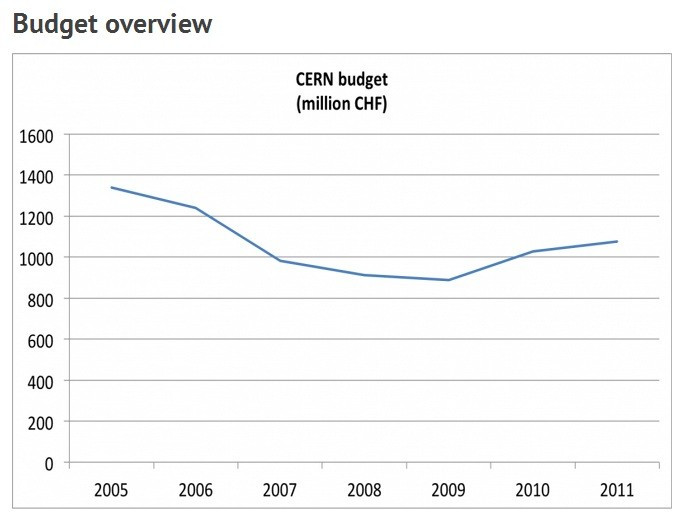
CERN's battle with the EC against budget cuts continues.
On 27 November, EU leaders walked away from talks on finding a deal on the bloc's total budget cuts for 2014-2020 but European Council President Herman Van Rompuy, who chaired the summit, proposed cuts in a number of areas, including research and innovation.
Horizon 2020 is the financial instrument implementing the Innovation Union, a Europe 2020 flagship initiative aimed at securing Europe's global competitiveness and runs during that six year period with an €80bn budget.
While details of the cuts are yet to be confirmed, Van Rompuy is tipped to want to slash the budget by €80bn in this type of sector.
"We keep hearing that Europe has a shortage of qualified scientists and engineers running to a deficit of tens of thousands of graduates each year." said CERN's Heuer. "If that's the case in recession, think what the shortage will be when the economy picks-up. Cutting science budgets not only damages science in the short term, it passes the wrong message to the young people who could be the scientists and engineers of the future. It would be an unqualified error."

Hurting Tech Development and Delivery
CERN was initially created as an intergovernmental organisation that would bring together the most advanced technological minds to bring about important scientific discoveries, in order to further and better our society.
There are now 20 member states and through the years CERN has pioneered some extraordinary developments that have changed the way we live our lives.
As the birthplace of the World Wide Web, industry, business and global interaction has completely transformed from when it became truly publically available in the 1990s.
What is sometimes forgotten is that "open science" policy at CERN favours making the methodology, data and results of experiments freely available. This also includes using "open source" in the development of software.
So when companies such as GSK, IBM and Airbus cry out about how it will hurt economic recovery, it is not surprising that companies that are freely able to use some of the most scientific breakthroughs for the development of new products, services or treatments, without spending a personal company amount on research and development directly, are concerned.
"No company, not even Microsoft, would be able to develop software projects of the scale and sophistication required for CERN's experiments at an affordable price," said Jean Marie LeGoff, heads CERN's Technology Transfer Office (TTO) in a lecture.
"On technology transfer aimed at a commercial return, you can't get one without the other. Patenting is something that is not essential to an open science environment, but it is something that absolutely is needed by industry to develop products and bring them to market. We don't develop products, we develop technologies and some of these are just too advanced, too costly and too far removed from daily life for there to be market interest. So, it is a question of timing," he added.
When IBTimes UK visited CERN electronic engineers and physicists described how the level of scientific discovery and then implementation meant that the commercial market would see the effects about 10 years after it had been discovered, as demonstrated by the creation of the WWW.
"We are always about 10 to 20 years ahead of the commercial market and at the moment because of the LHC Computing Grid and our patent policy, companies like IBM are looking to implement the supercomputer capabilities into you tablet or laptop. Going back to the birth of the WWW, our lives wouldn't be anything we have today if CERN didn't create it. The time, money and resources would have been too much of a strain for one company," said one scientist.
The LHC Computing Grid was created to distribute data storage and processing seamlessly between continents, nations and institutions. While it is used as a supercomputer to crunch the data for the wider experiments for searching for the Higgs Boson particle, this is a prime example how the parts of experiments can develop into huge commercial opportunity.
"If we believe there is commercial potential in specific markets then we will seek patent protection in those countries. Patent protection is important to us because, although it can take around 10 years for a CERN technology to reach the market, it enables us to establish licensing agreements with industry, to diffuse the technologies and to generate a return on the licenses for the life of the patent and to minimize the financial burden on the Organization," said LeGoff.
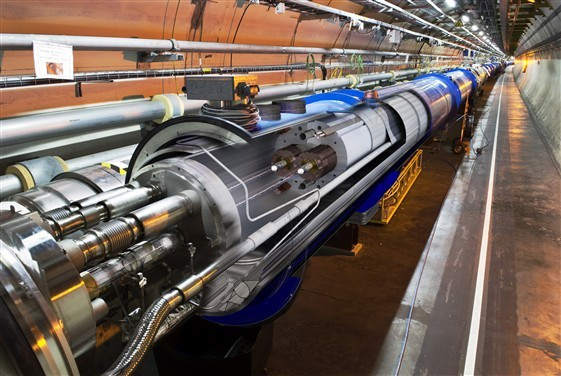
Damaging Healthcare and Engineering Industries
As previously established, if budget cuts slow the process of discovery, it will have a longer term impact on the European economy and other regions as a whole, as industry is naturally behind the curve.
While technological hardware and software will be impacted, healthcare and engineering will also take its toll.
Many pioneered medical treatments have been discovered and then applied to healthcare from CERN, mainly in cancer treatments. An iconic treatment that came out from CERN is proton therapy, which uses beams of protons to irradiate diseased tissue, most often in the treatment of cancer, which is one of the most accurate ways to localise radiation dosage and not damage as much healthy tissue.
Moreover, CERN itself is one of the world's largest civil engineering projects in the world.
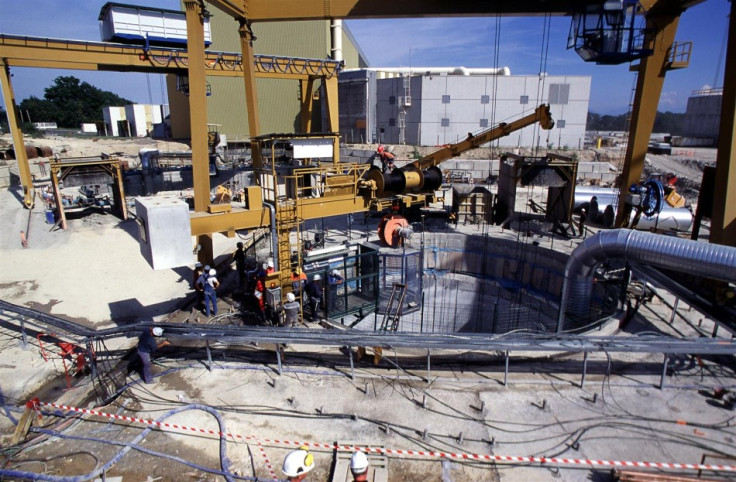
The knock-on effect for employment and development is also crucial for the rest of Europe.
For instance, in order to build CERN infrastructure and experiments, it then reaches out to companies that will develop and build the equipment.
Draka, part of the Prysmian Group, is a global supplier in optical fiber, fiber- and copper cables and wired up CERN's largest particle accelerator.
The Large Hadron Collider (LHC) is probably the most complicated and most expensive scientific experiments man has ever attempted and in 2003, CERN contracted Draka to supply and install optical fiber cables in and around the LHC.
In 2006, CERN gave Draka with a Golden Hadron, which is an award, which recognizes suppliers who do not only meet CERN's requirements but exceed the contractual obligations.
Companies like this then are able to capitalise on such accolades and physical capabilities and in turn are able to profit across the globe by saying they have CERN-worthy technology.
CERN also has a direct impact on country employment and industry.
The UK plays a major role in the LHC project, where a number of companies supply CERN with the maintenance or products for certain areas.
As just two examples, West Midlands firm Caparo Accles & Pollock supplied beam screens for the LHC, while IT manufacturer Viglen has recently won a contract to supply servers and processors that will be used in the computer centre.
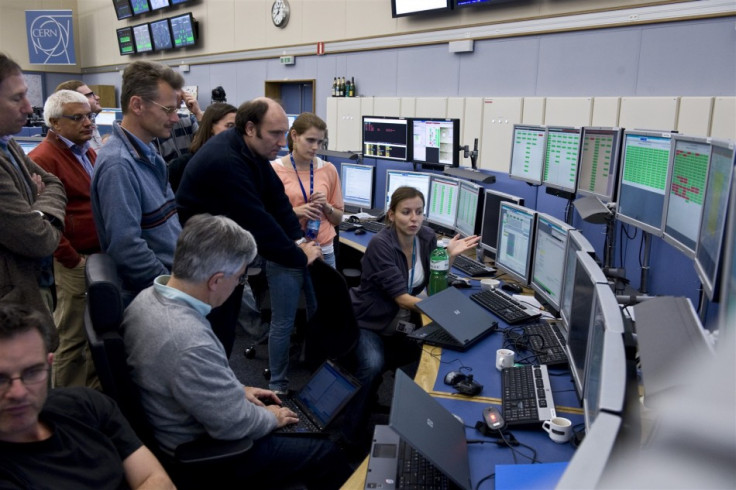
Employment and Talent
With a cutback in budget and therefore resources and projects, it will impact European economic recovery as the impact on employment will also be felt.
The wealth of talent at CERN is a priority for how discoveries are made. You may have the best equipment in the world but it requires humans to bring discoveries to light.
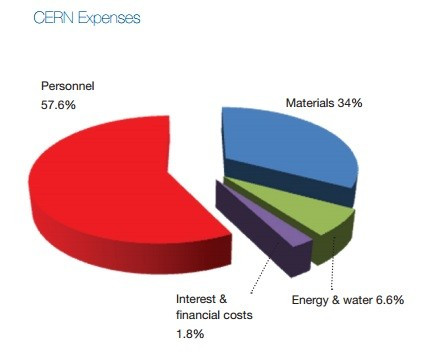
In 2011, CERN's annual report revealed that it spent 57.6 percent on personnel (Fig. 2) and the breakdown in types of employees range across a number of areas (Fig. 3).
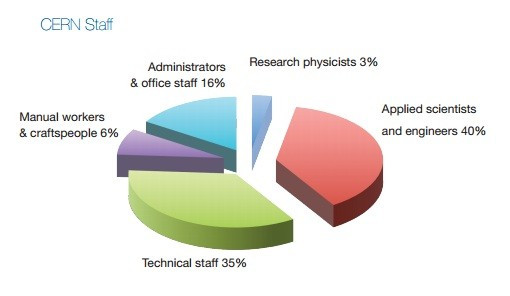
CERN officials have said that one of the major concerns over the budget cuts is that it will weaken the training programme of the upcoming researchers and will affect the bigger infrastructure projects that are important to economic growth of the state.
Another scientist who signed this month's open letter, Professor Andrew Harrison, director of the world-class Institute Laue-Langevin (ILL) research centre in Grenoble, France, told the Guardian newspaper that cuts to the budget could undermine Europe's position as a global leader in science.
"When it comes to the economy and growth, science and innovation have to be at the centre of that. Unless we make smart decisions now, we're going to get trampled over in the next decade or two. We passionately believe in science, but hard-headed business underpins this," he said.
If a flight of talent leaves CERN then discovery and industry will go with it.
Already, in the heart of the Middle East in Jordan, several Arab nations are looking to build a multi-million-pound synchrotron particle accelerator and research facility, dubbed as Sesame, which is set to rival CERN.
Apparently, after years of doubts about the project's feasibility, reports show that the first set of experiments could start as early as 2015, after it reached an 'advanced stage' and that the next round of finance is secured.
© Copyright IBTimes 2025. All rights reserved.






















